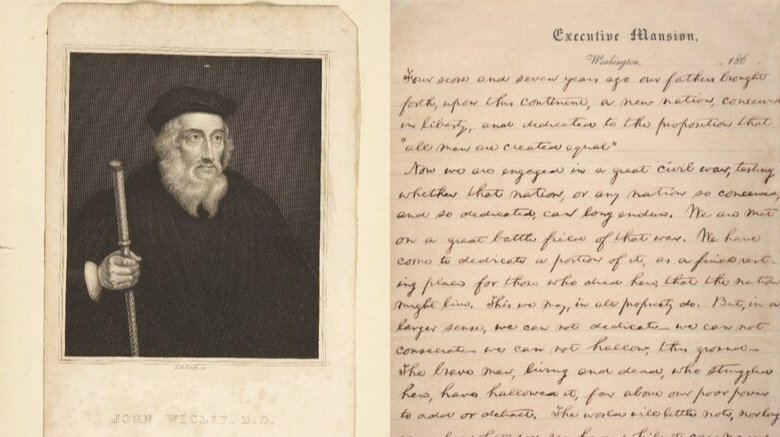This is a short one, but I thought I’d chime in on something. While browsing around for some information about the General Prologue to the Wycliffite Bible, I stumbled upon this blog post from the Volokh Conspiracy. Basically, there’s a myth going around that the General Prologue to the Wycliffite Bible contains the sentence, “The Bible is for the Government of the People, by the People, and for the People.” Eugene Volokh, the author of the blog post, noted that this “smacked of myth,” and I am writing to confirm his suggestion.
About a year and a half ago, the Washington Post, famous for its infallible and omniscient Fact Checker, published a Letter to the Editor jabbing Neil Gorsuch for his slip on the origin of this clause. The Letter then goes on to lecture us on the actual history, attributing the clause to 1384, the year when “John Wycliffe wrote in the prologue to his translation of the Bible, ‘The Bible is for the Government of the People, by the People, and for the People’ (Familiar Quotations by John Bartlett, 1951 edition).”

This would be an interesting origin story for the quote from Lincoln’s Gettysburg Address, if only it were true. Alas, I have read the entire length of the General Prologue, and though it makes many suggestions for kings, I never noticed anything resembling “Of the People, by the People, and for the People.”*
As a fun side note, most of the Prologue spells “people” with the Middle English “puple.” Imagine Lincoln’s powerful oration ending with “this nation, under God, shall have a new birth of freedom, and that government of the puple, by the puple, for the puple, shall not perish from the earth!”º
While I’m at it, I might as well dispel a few other myths about the Wycliffite translation. It’s highly unlikely that Wycliffe himself did the translation work. Most scholars agree that some of Wycliffe’s disciples did the actual work of translation. Nowhere in contemporary records is Wycliffe conclusively shown to be the translator, and the task of translating the entire Bible (twice through, mind you) would have been too massive when compared with the rest of Wycliffe’s output at the time. Similarly, Wycliffe almost certainly did not write the General Prologue (which is neither General nor much of a Prologue). Many other myths abound concerning the Wycliffite translation (some way off the charts), but that is a discussion for another time. In the meantime, I hope this reminds us to approach popular histories of textual transmission with a little more skepticism and better research!
P.S. This blogger quotes the following from Notes and Queries (Feb. 12, 1916, p. 127):
The phrase “of the people, for the people and by the people” is not original with Lincoln. There is a tradition that the phrase, “The bible shall be for the government of the people, for the people and by the people,” appears in the preface of the Wyclif bible of 1384, or in the Hereford Bible, or in a pamphlet of the period treating that version.
Now, Lollards (followers of Wycliffe’s theology) wrote quiet a wealth of pamphlets, sermons, etc. I’m still skeptical, but I can’t claim to have read all Wycliffite writings. It’s totally fair to qualify this as a tradition. Perhaps, one day, I’ll stumble upon this phrase in a medieval manuscript!
* OK, I haven’t read every manuscript of the General Prologue, and, yes, there are inconsistencies from one manuscript to another. But I read Mary Dove’s edition, and she cataloged and read the various manuscripts. She notes differences between manuscripts, and I trust she would have noted even a rogue appearance of “of/by/for the People” in a manuscript.
º Another fun aside: the General Prologue does include the word “sourdough,” meaning “leaven.” This produces some funny readings to the modern American. See below from Chapter 12 of the General Prologue, in which the author explains how a word in the Bible can sometimes mean something good, other times something evil:
Also sourdough is set sumtyme in yuel, where Crist seith ‘be ye war of the sourdough of Farisees, which is ipocrisie’; sourdough is set also in good, whanne Crist seith ‘the rewme of heuenys is liyk sourdough’, etc.
Beware of the sourdough of Pharisees!
The Kingdom of Heaven is like sourdough!


Leave a Reply